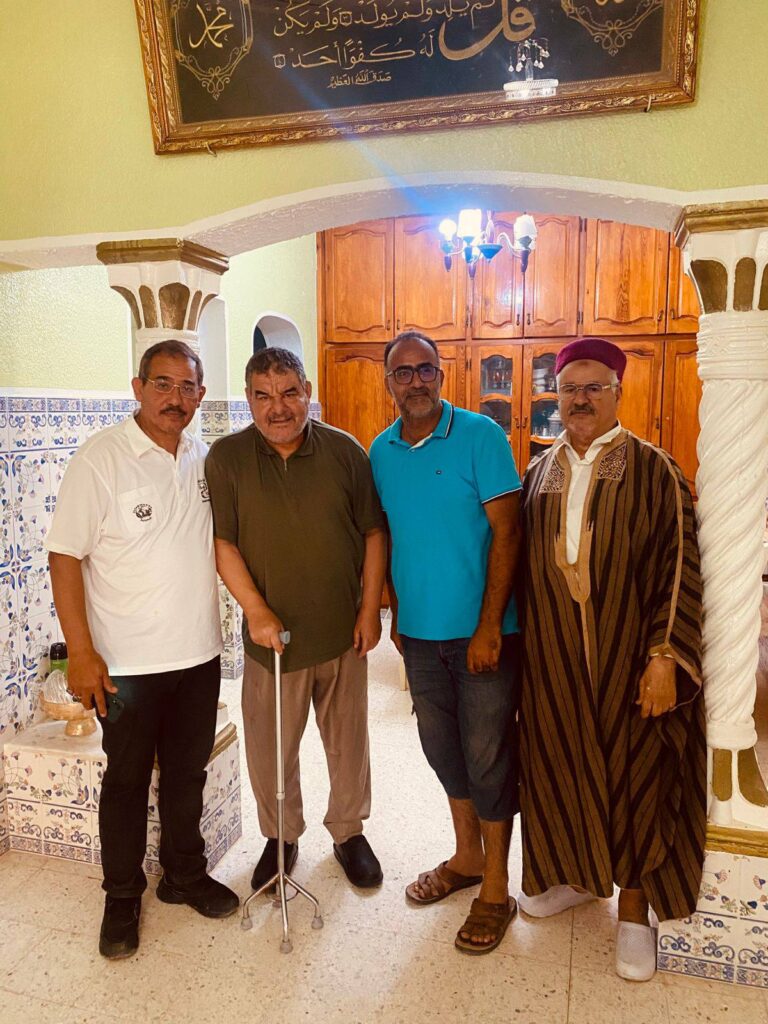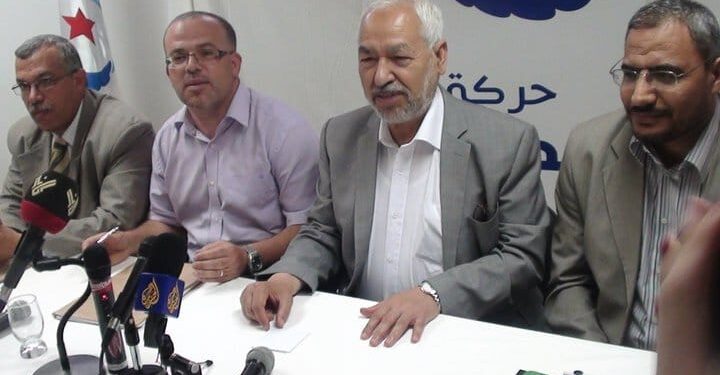Several historical figures of the Ennahdha movement, long dominant on the Tunisian political scene, are today absent from the public debate or face legal proceedings. What happened to these leaders who, for a decade, shaped the post-revolution?
Since July 25, 2021, several leaders of Ennahdha-a former pillar of post-revolution’s Tunisian political life-face legal proceedings, travel restrictions or forced withdrawal from the public scene. Some, such as former Minister Mohamed Ben Salem – of which a recent photo with a journalist was published on social networks – are in a the least that can be concerned. Others are incarcerated or live abroad. What happened to these political figures yesterday?
Rached Ghannouchi, a fallen central figure
Rached Ghannouchi, president of the movement and former president of the Assembly of People’s Representatives, was imprisoned in 2023. Aged over 80, he was sentenced to several sentences in cases related to terrorism and money laundering, accusations that his relatives describe politicians. His imprisonment symbolizes the end of an era for Ennahdha and for political Islam in Tunisia.
Ali Laarayedh, the former head of government behind bars
Ali Larayedhformer Minister of the Interior and then Head of Government in 2013, was also arrested. He is prosecuted in the so -called “Shipments to conflict areas”, which concerns the departure of young Tunisians to Syria. Like Ghannouchi, he rejects the accusations and denounces a political trial.
Hamadi Jebali: a progressive withdrawal
First head of government after the 2011 elections and historic figure of the Ennahdha movement, Hamadi Jebali Gradually moved away from the party even before the political rupture of 2021. Resignment of Ennahdha in 2014, he attempted an independent political adventure, without real success.
In recent years, he has been talked about through some legal troubles, including an arrest in 2022 in an alleged money of money laundering, which has aroused critical reactions from his family and certain activists. Liberated subsequently, Jebali now lives in relative discretion, without apparent political activity. However, its name remains associated with a pivotal period of the post-revolutionary Tunisian transition.
Abdellatif Mekki, converted and criticism
Former Minister of Health, Abdellatif Mekki has distanced himself from Ennahdha even before July 25. He founded a new party, “work and realization”, and today criticizes both the current power as the past errors of the Islamist movement. His attempt to reinvent himself politically remains marginal.
Abdelkarim Harouni : Eternally prosecuted!
Former Minister of Transport and Chairman of the Ennahdha Choura Council, Abdelkarim Harouni was placed under house arrest in September 2023 and then arrested for a few months. This measure was denounced by Ennahdha as an attack on freedom and an attempt to consolidate an authoritarian regime.
Lotfi Zitoun, on the run
Other dissident figure, Lotfi Zitounlong right -hand man of Ghannouchi, left Ennahdha in 2020. He converted into the strategic council and rarely speaks publicly. If he retains an intellectual hearing, he moved away from the political arena. However, he was sentenced to 30 years in prison and would be on the run abroad for prosecution within the framework of the Installo case.
Mohamed Ben Salem: between legal troubles and health problems


Among the striking figures of Ennahdha, Mohamed Ben Salemformer Minister of Agriculture under Troika, illustrates the complexity of the current period. Aimed by a travel ban for several months, it is also the subject of prosecution in financial affairs that are not judged. His situation recently drawn attention after the dissemination of testimonies highlighting his physical deterioration and his difficulty in access to care.
Sahbi Atig: Prison!
Another leader in Ennahdha who is in detention. Sahbi Atig would be linked to a case concerning the discovery of sums in foreign foreign currency following the burglary of his home.
Samir Dilou: Back to the black dress
Former Minister of Human Rights and eminent member of Ennahdha, Samir Dilou has distanced itself from the movement of the movement long before July 25, 2021, denouncing certain internal orientations. Since Ennahdha’s sidelining of the political scene, he has returned to his profession as a lawyer, which he has never completely abandoned.
Very active in the affairs of public freedoms and the defense of political or union figures, Dilou today adopts a posture of defender of rights, intervening in several sensitive files. His return to professional origins marks both a continuity in his commitment and an attempt to reposition himself outside the partisan executives.
Noureddine Bhiri: between detention and discretion
Former Minister of Justice and influence of Ennahdha, Noureddine Bhiri has experienced several episodes of detention since 2022, without any final judgment being pronounced to date. He was notably arrested in the case of abuse of power and suspicion of corruption, according to the authorities. His state of health had aroused concern during his first detention, especially after a hunger strike.
Rafik Abdessalem: exile
Former Minister of Foreign Affairs under the Ennahdha government, Rafik Abdessalem Lives today in exile. Since his departure from Tunisia, he was very critical of the current regime, denouncing what he described as authoritarian abuses and restrictions on public freedoms.
He regularly uses social networks and international media to challenge the international community and Tunisian political actors. Its forced distance testifies to the persistent tensions between certain historic frameworks of Ennahdha and the Tunisian post-20121 authorities.
Imed Hammami: a course marked by changes in position
Former executive of Ennahdha, Imed Hammami has stood out in recent years by a notable political turn. Initially close to the movement, it has gradually distanced itself, adopting a critical posture or even opposed to the official party line and a Saied pro-Kais.
This change of course was perceived by certain observers as a reversal, illustrating internal fractures and tensions linked to the evolution of the Tunisian political landscape. Hammami now intervenes as an analyst or commentator, sometimes within independent media, adopting a freer and critical tone towards his former allies.
The impossible Renaissance?
With a demobilized base, a beheaded direction and a tarnished image, Ennahdha seems today unable to bounce back. While some analysts believe that movement could be reborn in another form, the history of the movement thus its post -revolution assessment complicate any return in force.








